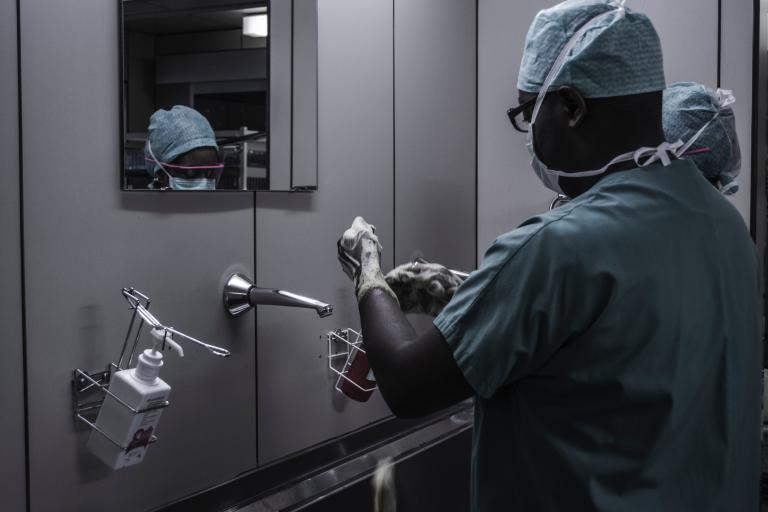Dr. H is a world renown expert in colorectal surgery. After an M.D. from Columbia University, postdocs and various residencies, he’s been performing colon related surgery for roughly fifteen years. He is articulate. He is serious and sincere. He did two procedures on Audrey (my wife). And he uses the word “poop.”
I don’t know if this surprises you.
His vocabulary was a pleasant surprise to me — a breath of normalcy when our lives were being sucked into a strange new world where cancer and medical facilities and treatment options constantly surrounded us.
Going through cancer treatment with my wife has given me a front-row seat to the work of others (around 14% of our working population are in healthcare). This post is part three in a series reflecting on the connections between cancer and work. In this episode, we dive into perhaps the best gift we received from our caregivers: the gift of humanity.
Humanizing Language
Audrey’s challenge was colon cancer. We spent a lot more time reviewing, hearing about, and considering, more names, parts, and functions of the digestive system than we ever imagined was possible. Doctors and nurses have their own language. Lab reports are opaque and hard to understand. We’ve spent hours googling terms and looking at diagrams to try to comprehend what system or condition or blood level was being referenced. But poop; that we understood.
The “poop” term reminded me of a doctor friend from years ago. I recall he was going to teach his children to say urinate and defecate instead of pee and poo. Eventually, he succumbed to the common tongue. His struggle perhaps warped my impression of doctors — that they felt pressure to be technical and erudite all the time. Or perhaps (and this is true of all knowledge-based work), technical terms make a point of their special knowledge — their power to heal through science.
In contrast, here was Dr. H using common terms for common functions. It sounds odd, but it was a strange relief. “Poop.”
When you are being treated for a serious medical condition, you feel as if your body is not your own. When you are there to support your loved one, it is very disempowering. There are tubes and tubs, monitors and alarms always going off. It’s as if this person you love is now, part cyborg.
Having someone talk “poop” feels very human, very real, very down to earth. With the use of so much advanced technology, making patients feel human in the midst of their trial is perhaps the best thing a doctor can do.
And it’s not just good for the patient, it is good for doctors too.
The Joy In Medicine
I facilitated a discussion group for doctors at a national men’s retreat. They were from all over the U.S. The breakout was for anyone who worked in healthcare. I asked them to report to the group their greatest joys and challenges in their profession. A consistent theme emerged: doctors find the greatest meaning and joy in one-on-one connection with their patients, in moments of seeing the direct benefits of their care. The human element is what captures their hearts, what they remember, what gives them an impetus to head back and do it again and again.
(As an aside, the “business” of medicine — figuring out how to get paid for services rendered and fairly compensate a staff is where most of the frustration and challenges were reported in our group.)
Humanizing interaction, whether on the receiving end or the giving end, is what makes work impactful.
Leaning Into the Human Dimensions of Work
It’s easy for me — busy, task-oriented, and dreaming of more impact and income, to miss the humanity all around me at work. Many of my clients and those who attend our workshops at VOCA, also face a significant challenge — noticing the humanity right in front of them. So much to do, and operating within an increasingly transactional culture in every aspect of business makes it easier to see people as resources, barriers, or just 2-dimensional artifacts of the scenery.
Consider some humanizing ideas from Scripture:
- Every person is made in God’s image, and so reflects his being.
- Human beings are crowned with glory and honor and given power over nature.
- We are told to love our neighbor — to notice and care for those who are near.
- We are told to celebrate with those who are celebrating and to mourn with those who mourn.
- We are told not to play favorites.
How do we put this principle into play and call out the God-given humanity of those we meet at work?
- First, see everyone as a full person. We believe everyone has value, but it is easy to forget certain individuals and even groups of people. If my Uber driver isn’t chatty, do I ignore her? Why don’t I stop and talk to the doorman in our building when he says hello? It’s not very polite to talk out of the side of my mouth while walking by. There may be people who scare us, bother us, block us, or intimidate us. In each case, it’s easy to forget that they have needs and fears, gifts and fatal flaws, joys and sorrows, but they do.
- Second, start with a few. Many of us take ourselves out of the game when we conclude the game cannot be won. How can I treat everyone I meet as human? How can I stop what I’m doing? Start with one or two souls you’ve neglected. Get to know their names, their family situations, where they live, and what they are passionate about.
- Third, follow up with these new neighbors. Remember the themes and details they shared. Be honest and vulnerable yourself.
- Fourth, celebrate the competencies and extra efforts of others with specific praise. Explicit compliments make a huge difference. Go past “thank you” to “the way you did that really meant a lot to me, because _______.”
How about you?
- Have you ever been in a situation that generally made you feel less than human, only to be pleasantly surprised by the actions of someone who called you back to your humanity? What did they do? How did you feel? What can you learn about the way God has made us from this experience?
- Everybody you work with is human. Really. How can you notice, join with, and celebrate, the human beauty that God has placed around you at work? How can you take your best practices (often reserved for customers and bosses during promotion season) and extend them to others? Who are the first three people you’ll add to your personal roster of the Human race?
Dr. Chip Roper writes Marketplace Faith from New York City, where he is the Founder and President of the VOCA Center. Under Chip’s leadership, VOCA rescues clients like you from the forces that rob them of effectiveness and joy at work. VOCA provides coaching, training, and consulting to individuals and organizations in NYC and beyond. Visit our faith-based website at vocacenter.org and our market-facing menu of services at www.vocacenter.com.












